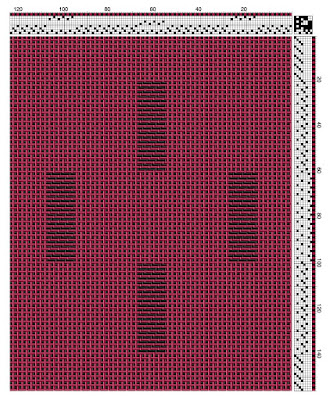To me, that looks like happy cloth: All crinkled and intricate with blocks in black that remind me of fish swimming upstream.
So often, collapse fabrics mimic nature, with its organic forms and energy. Nothing flat or two dimensional about it, which is why I love it.
The samples I'm sharing in this blog post hark back to a workshop I took in London with Ann Richards, author of Weaving Textiles That Shape Themselves. That workshop was in 2014 and it continues to inspire me.
One of the drafts Ann shared with us was a double-weave structure on 8 shafts using a warp of 30/2 silk and 30/1 Z twist or S twist wool -- your choice -- to create alternating layers of silk and wool. The weft was the same -- and you could again choose either 30/1 S twist or 30/1 Z twist wool for the second layer. (If you chose the same twist for both warp and weft, you would get a more subtle collapse effect after washing. If you used yarns with twist in opposite directions for warp and weft, you would get a greater collapse effect. I used 30/1 Z twist in the warp and 30/1 S twist in the weft.)
Here's Ann's original structure.
Here are my samples.
Front before washing
Back before washing
Front after washing
Back after washing
Pretty cool, huh? As always, I stand in awe of the laser-sharp focus that Ann brings to her designing. I tried my hand at modifying the tie-up and treadling, so see if there were some new forms I could create from this. First I decided to weave linear stripes.
Here's the drawdown, same threading.
And here are my results. In order of appearance: front and back before washing and front and back after washing.
The vertical pleats on the front are crisp, which I like very much -- but the back also has some visual appeal. There's potential here, perhaps to develop a draft that turns the stripes into boxes. More playing with Fiberworks, which I don't mind at all.
(As I write this, I realize that this post is mostly photos. But that's what we do, right? Create visual art that is often hard to describe verbally, although we do the best we can.)
So here's the last drawdown, this time with interrupted lines of black on the front. The finished fabric can be seen in the image I started with in this blog post.
And here's the fabric, again showing front and back before washing and after washing, in that order.
So often for me, weaving samples prompts as many questions as it answers. What can I do next? What kind of garment would this make? Would it work with painted warps? How can I alter this structure to make it appealing in a new way? I never considered myself to be a weaver who follows the code of "Sample, sample, sample" -- but I'm beginning to see the benefits of doing so.
And so, dear reader, beam on! And thanks for visiting.
















No comments:
Post a Comment